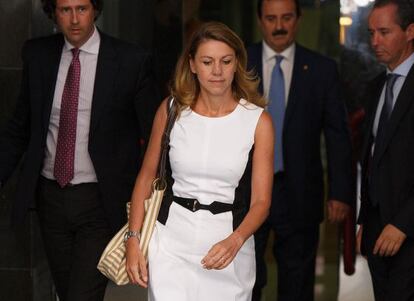PP number two blames Rajoy and her predecessor for deal with Bárcenas
De Cospedal “did not know” of decision to continue salary payments to jailed former party treasurer after his official dismissal Secretary general denies personally receiving bonuses


Popular Party (PP) secretary general María Dolores de Cospedal on Wednesday placed the blame on Prime Minister Mariano Rajoy and her predecessor as party chief, Javier Arenas, for the ongoing salary payments made to now-jailed former treasurer Luis Bárcenas after the latter had officially stepped down from his position in 2010, according to lawyers who were present at the High Court.
Testifying before Judge Pablo Ruz, De Cospedal denied that there was any parallel accounting inside the PP, as ledgers belonging to Bárcenas purportedly show, and claimed that she had never received any bonus money, as the former treasurer claimed he had given her.
De Cospedal, the number two in the PP, is the highest party official so far to testify in the ongoing case regarding Bárcenas’ secret ledgers. On Tuesday, Arenas and Francisco Álvarez-Cascos, who both served as secretary generals prior to De Cospedal, also denied that they received payments during their own testimonies before the High Court. Arenas is now deputy secretary general and considered the party’s number three, while Álvarez-Cascos has since left the party to run his own conservative splinter group in Asturias.
She said that she had broken off all relations with Bárcenas in 2009, the same year that he was named a defendant in the Gürtel political corruption case.
But it was her explanations about a pact between Bárcenas, Rajoy and Arenas which were the most revealing elements of Wednesday’s testimony. De Cospedal said that she wasn’t at the meeting in March 2010 where it was agreed that the former treasurer would continue to receive pay as part of his severance package.
In late February, De Cospedal gave a confusing explanation to the effect that Bárcenas had received "deferred" severance pay
Up until January 31, the very day on which EL PAÍS published the ledgers, the PP was still paying Bárcenas’ social security contributions, according to the ex-treasurer who still has a lawsuit pending against the party for wrongful dismissal.
In late February, De Cospedal gave a confusing explanation to reporters to the effect that Bárcenas had stopped working in 2010 but had reached an agreement with the party to continue drawing his severance pay on a monthly “deferred” basis, complete with social security payments and tax deductions.
Contradicting De Cospedal's version, Bárcenas has told the court that he was working as a PP advisor from March 2010 up until January 31 of this year, when he found out through the press that the party had stopped paying his contributions without his consent. He had continued to use a meeting room at the PP headquarters in Madrid as an office up until January.
According to lawyers who were present during her more than two-hour testimony, De Cospedal said she did not control any of the party’s finances and said that she found it strange that records could exist that show the national ID card numbers of anonymous PP donors, as some of the Bárcenas ledgers allegedly show.
Tu suscripción se está usando en otro dispositivo
¿Quieres añadir otro usuario a tu suscripción?
Si continúas leyendo en este dispositivo, no se podrá leer en el otro.
FlechaTu suscripción se está usando en otro dispositivo y solo puedes acceder a EL PAÍS desde un dispositivo a la vez.
Si quieres compartir tu cuenta, cambia tu suscripción a la modalidad Premium, así podrás añadir otro usuario. Cada uno accederá con su propia cuenta de email, lo que os permitirá personalizar vuestra experiencia en EL PAÍS.
¿Tienes una suscripción de empresa? Accede aquí para contratar más cuentas.
En el caso de no saber quién está usando tu cuenta, te recomendamos cambiar tu contraseña aquí.
Si decides continuar compartiendo tu cuenta, este mensaje se mostrará en tu dispositivo y en el de la otra persona que está usando tu cuenta de forma indefinida, afectando a tu experiencia de lectura. Puedes consultar aquí los términos y condiciones de la suscripción digital.








































